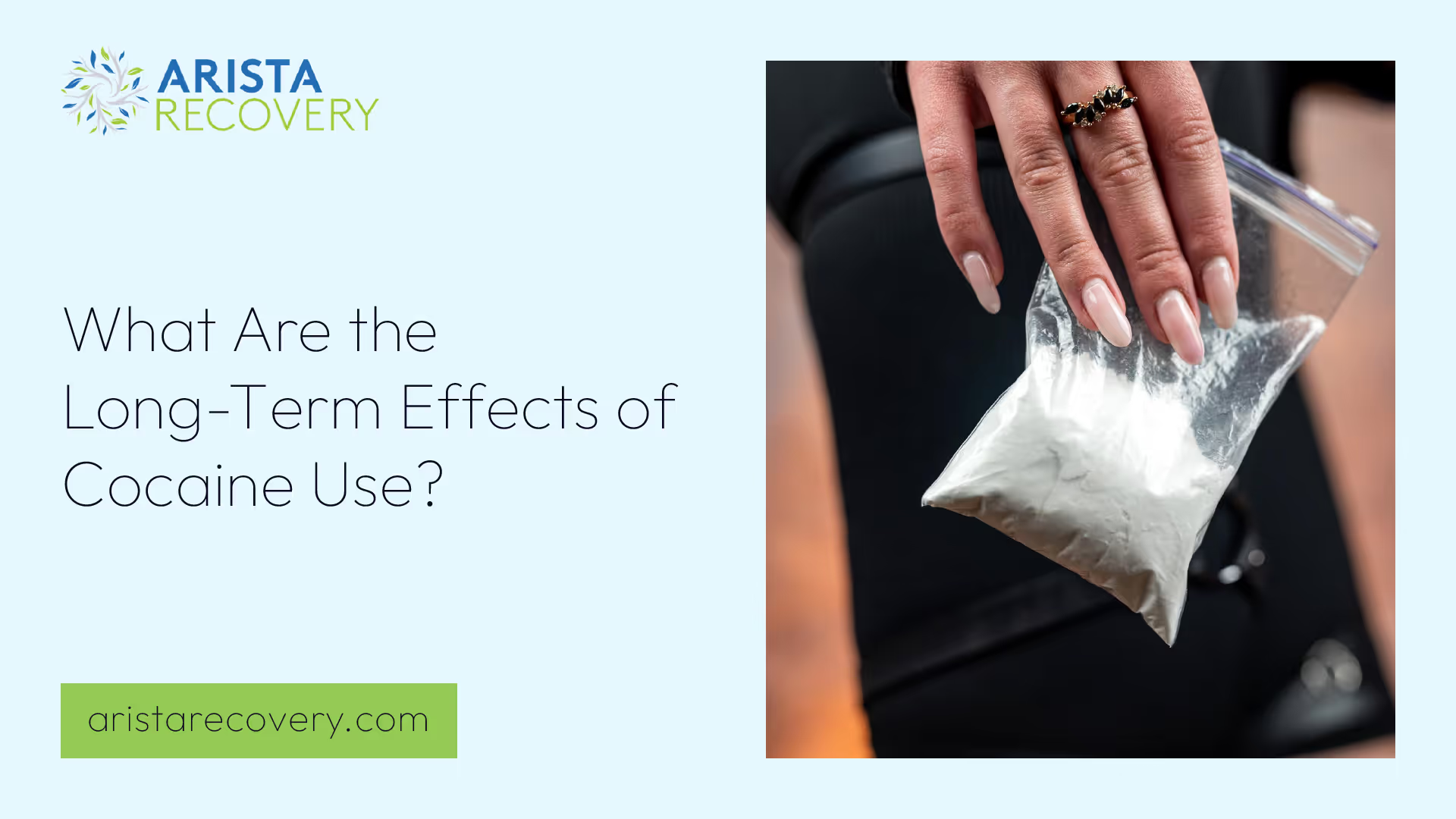What Are the Long-Term Effects of Cocaine Use?

Cocaine users are focused on one thing and one thing only, and that is getting high. The intense and euphoric rush cocaine produces takes center stage in the user’s everyday life. As users chase that high daily, the drug itself inflicts significant physical and psychological damage. Over time, the long-term effects of cocaine use often destroy the user and their family, and that damage can be beyond repair.
This article will further explain the symptoms of long-term cocaine use and the devastating impacts of cocaine’s long-term effects on those addicted to the drug. If you or a loved one are in the grips of cocaine addiction, now is the time to act! Arista Recovery features cocaine treatment that is evidence-based, extensively tested, and proven to help you break free from cocaine addiction for good.
Arista Recovery offers comprehensive mental health and addiction treatment. Contact us today to learn more about our full continuum addiction treatment center.

What Are the Symptoms of Long-Term Cocaine Use?
One of the obvious symptoms of long-term cocaine use is tolerance. Over a short period, users will need to use more cocaine to achieve the pleasurable effects they desire. Along with increased tolerance, cocaine’s long-term effects include increased vulnerability to developing seizures, anxiety, and convulsions if users take fewer doses. Cocaine users tend to binge on cocaine which increases irritability, panic attacks, hallucinations, and can even develop psychosis.
The long-term effects of cocaine also depend on the method of administration. For example, snorting cocaine can lead to a loss of sense of smell, nosebleeds, and a chronically runny nose. Those who smoke crack cocaine will experience lung damage and develop or worsen asthma. Those who inject cocaine run the risk of contracting infectious diseases such as hepatitis C and HIV through dirty needles. Additionally, cocaine damages major organs, and other symptoms of long-term cocaine use include an increased risk of heart attack and stroke.
Cocaine and the Use of Other Illegal Drugs
When talking about the long-term effects of cocaine use, the topic of polydrug use comes into question. Many cocaine users will also use other substances in addition to cocaine. These substances are used to amplify or negate the effects of cocaine. The chances of overdose and death increase dramatically when multiple drugs are being abused. The following are common combinations used by cocaine users:
Cocaine and Alcohol: cocaine users will drink alcohol to negate or lessen the high of cocaine. The combination of these substances produces a chemical called cocaethylene, which has toxic effects on the heart, liver, and other organs.
Cocaine and Heroin: the use of cocaine and heroin are called a speedball by users. Cocaine stimulates the central nervous system, while heroin depresses the central nervous system. This combination can cause significant breathing difficulties and has adverse effects on the heart rate.
Cocaine and Ecstasy: both drugs are stimulants and create an accelerated heart and an increase in body temperature.
Cocaine and Antidepressants: when users combine cocaine with an antidepressant such as Zoloft or Prozac, it creates an overload of serotonin in the brain. This can lead to tremors and irregular heartbeat and increases the risk of seizures and death.
What To Look For in Cocaine Treatment Programs
The long-term effects of cocaine take a heavy physical, mental, and psychological toll on users. To break free from the grips of cocaine addiction, users must find professional help. If you are looking for treatment for yourself or a loved one, the best cocaine rehabs feature evidence-based medical detox programs that allow you to safely wean off cocaine and allow you to regain physical and mental stability. These rehabs also feature multiple levels of care, such as intensive inpatient, outpatient, and partial hospitalization programs. Cocaine rehabs should feature the following programs:
- Individual, group, and family therapy
- Life and coping skills training
- Relapse prevention education
- 12-step group support
- Experienced treatment staff with proven experience
As one of the premier drug rehab facilities, Arista Recovery has garnered a reputation for providing evidence-based treatment programs personalized to meet each client’s unique needs. Using a dynamic combination of traditional and experiential therapies, the treatment professionals at Arista Recovery heal your mind, body, and spirit. Don’t let cocaine addiction ruin your life and the lives of those you love; call Arista Recovery today and begin the healing process at our inpatient drug rehab.
You’re not alone in this.
When mental health challenges and addiction intersect, it can feel isolating. At Arista, we offer compassionate, evidence-based, and trauma-informed care to help you heal, grow, and move forward.
You’re not alone in this.
When mental health challenges and addiction intersect, it can feel isolating. At Arista, we offer compassionate, evidence-based, and trauma-informed care to help you heal, grow, and move forward.
Support that moves with you.
You’ve taken a brave first step. At Arista Recovery, we’re here to help you continue with best-in-class care designed for long-term healing and support.
.webp)






